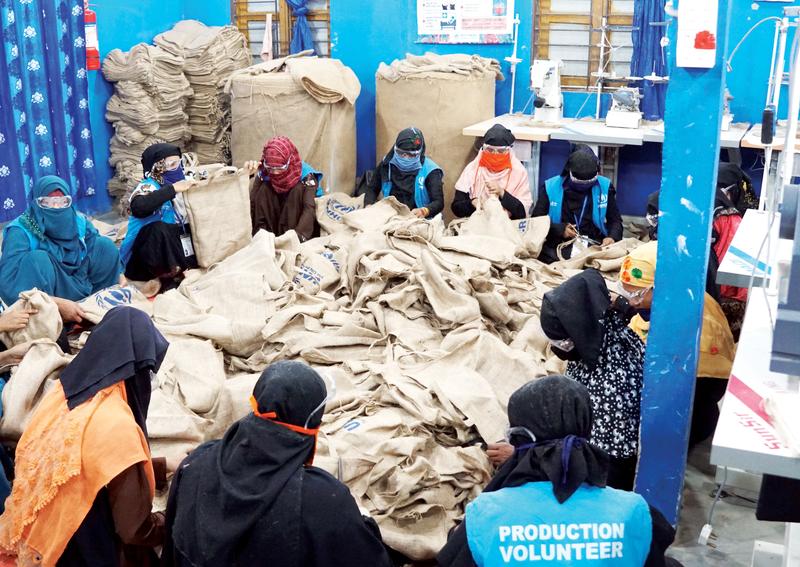Bangladesh and UNHCR look for lasting answers to the humanitarian crisis
 A jute bag production center at the Rohingya refugee camp in Cox’s Bazar, Bangladesh, on Dec 18. (YANG HAN / CHINA DAILY)
A jute bag production center at the Rohingya refugee camp in Cox’s Bazar, Bangladesh, on Dec 18. (YANG HAN / CHINA DAILY)
Life in the Rohingya refugee camp has never been easy for 26-year-old Senowara Begum.
But at least her work, four hours a day at the camp’s jute production workshop, does allow her a better life with her husband and two sons.
“I love to do this job and I don’t feel it is difficult for us,” said Begum, who was trained in how to make jute bags and has been working at the facility for two years.
“I think (doing this) can help me in bad times when there might be no aid or anything. I can still make a living.”
After fleeing violence in the Rakhine state of Myanmar in 2017, about 1.3 million Rohingya refugees are living in Bangladesh — most of them in Cox’s Bazar in southwest Bangladesh, making it the world’s largest refugee camp.
Though a repatriation agreement was signed between Bangladesh and Myanmar in 2017, the plan has been delayed ever since.
Bangladesh needs more political support to deal with the Rohingya refugee issue, said Mohammed Mizanur Rahman, joint secretary of the Refugee Relief and Repatriation Commissioner under the Bangladesh Ministry of Disaster Management and Relief.
“The solution is in the hands of Myanmar. It is not in the hands of Bangladesh,” said Rahman, hoping the international community can provide more help to resolve the issue. The massive number of refugees has placed enormous pressure on the South Asian country, which in 2021 was given the nod by the United Nations General Assembly to graduate from least developed country status.
To host the refugees, the government had to cut trees for settlement, said Rahman, adding the country had to sacrifice its forests for humanitarian needs even though it is also facing climate change challenges.
Rohingya refugees rely entirely on humanitarian assistance for protection, food, water, shelter and health, according to the UN High Commissioner for Refugees, or UNHCR.
The Bangladesh government, with support from international donors and humanitarian partners like the UNHCR, has been providing essential support to the refugees and improving their living standards through projects such as the jute production workshop and setting up classrooms inside the camp.
The Bangladesh government also has relocated some 28,000 Rohingya refugees offshore, to the island of Bhasan Char, where it has scaled up essential humanitarian services.
Like the majority of the Bangladesh population, most of the people in Cox’s Bazar depend on agriculture for their livelihoods. The area is also a popular tourism destination, boasting the world’s longest unbroken beach.
Repatriation of the Rohingya refugees remains the top and ultimate solution for the Bangladesh government, said Miah Md Mainul Kabir, director-general of the Myanmar Wing at the Ministry of Foreign Affairs of Bangladesh.
“We are still pursuing with Myanmar to arrange the repatriation,” said Kabir. “At the same time, we are seeking help of other countries, friendly nations like China, who are working with Bangladesh and Myanmar to arrange small repatriation.”
Noting that the repatriation must be voluntary, Kabir said Bangladesh is working with Myanmar to make necessary preparations and to create a better environment so as to ensure the refugees’ safety.
Kabir said the Bangladesh government has compiled and submitted to Myanmar a list of around 830,000 Rohingya refugees for potential repatriation, but that Myanmar has only verified and shared back a list of around 62,000 people so far.
All dialogue that leads toward peaceful and durable solutions regarding the Rohingya refugee issue is encouraged so that they can return home, said Regina de la Portilla, UNHCR communications officer.
She said the operation is already “severely underfunded”, reaching only about 50 percent of the current budget, and she is expecting a further reduction in 2023.
“We are seeing a budget gap, so we are trying to diversify to find solutions,” she said, noting the organization has to make difficult choices, reducing the supply of items such as soap and gas to each family.
Amid rising political and economic challenges around the globe, Kabir said the funding is gradually diminishing and he hopes the international community can provide more support as the issue will ultimately have an impact on other countries if it continues to escalate.
The size of the Rohingya refugee problem keeps growing, as every year around 35,000 children are born inside the camp, according to Kabir.
“The Rohingya issue is not an issue for Bangladesh … (it is) a global responsibility,” said Kabir.
With a population of 160 million, Bangladesh is already one of the world’s most densely populated countries and is vulnerable to natural climate calamities, said Kabir, adding the country cannot afford to host such a colossal number of refugees for an infinite period.
Kabir also said he hopes China can play a bigger role in helping facilitate the repatriation work between Bangladesh and Myanmar as it has good relations with both countries.


